Olive Oil vs Vegetable Oil: Which is Better? Let’s Compare
One of my jobs as a Certified Health Coach is to inform people about healthy food and oils. Olive oil and vegetable oil may be the two most common oils mentioned. I’m often asked, is olive oil better than vegetable oil?
Olive oil is better than vegetable oil due to its higher percentage of minerals, heart healthy monounsaturated fats and antioxidants. It contains potassium and calcium which vegetable oil doesn’t. It is less refined and processed. It has a stronger, more desirable flavor.
This article will describe the differences between the two and clear up some confusion about vegetable oil. I’ll include a side-by-side nutrient comparison and discuss their health benefits. In addition, I’ll examine when one can substitute for the other, their smoke points, tastes and prices.
I’ve purchased, researched and consumed both oils prior to, during and sometimes after writing this article.
Olive Oil vs Vegetable Oil: The Differences
Olive oil is made by extracting the oil from olives using heat and/or chemicals. Vegetable oil is extracted from multiple sources like canola, soybean, corn, sunflower and safflower. The finished olive oil is a blend of refined olive oil and extra virgin. The finished vegetable oil is a blend of different plant oils.
Vegetable Oil
Vegetable oil is a blend of various different cooking oils including the following:
- Canola
- Sunflower
- Soybean
- Corn
- Safflower
Most of the vegetable oils sold in the United States are not a blend and contain 100% soybean oil. I checked them in Walmart, Shoprite and Stop and Shop, and they all contained 100% soybean oil.
The companies would rather call it vegetable oil than soybean oil for marketing purposes. Also, it gives them flexibility to add in other oils when they please and not have to change the labeling, just the ingredients.
In addition, due to the supply chain and fertilizer shortages, farmers and manufacturers look for substitutes for corn and wheat. Soybean oil may be a good substitute to help with the scarcity of other oils.
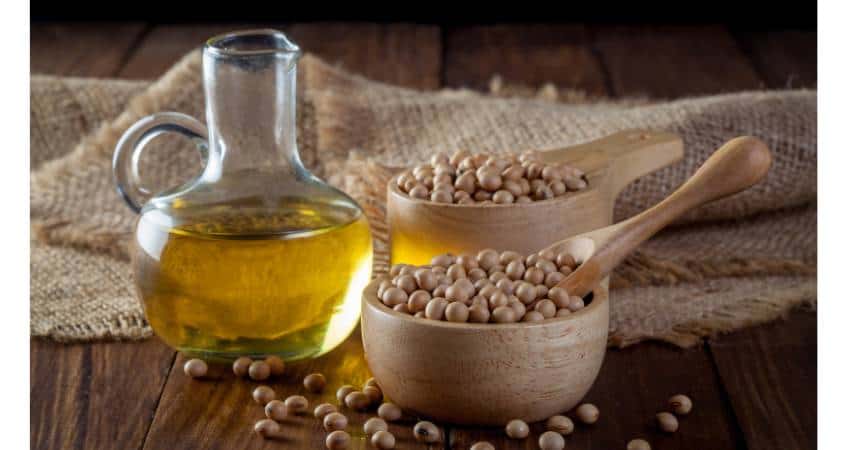
Vegetable oil facts:
- Made from pressed seeds and plant sources like corn, sunflower, soybean, safflower and canola.
- Has a mild, neutral flavor.
- Cost less money.
- Has a higher smoke point than extra virgin olive oil but lower than refined.
- Typical color is a pale yellow to a golden yellow.
Olive Oils
- Olive oil is made from pressed olives using heat and chemicals.
- Has a mild, peppery flavor.
- Cost more money.
- When refined it has a higher smoke point.
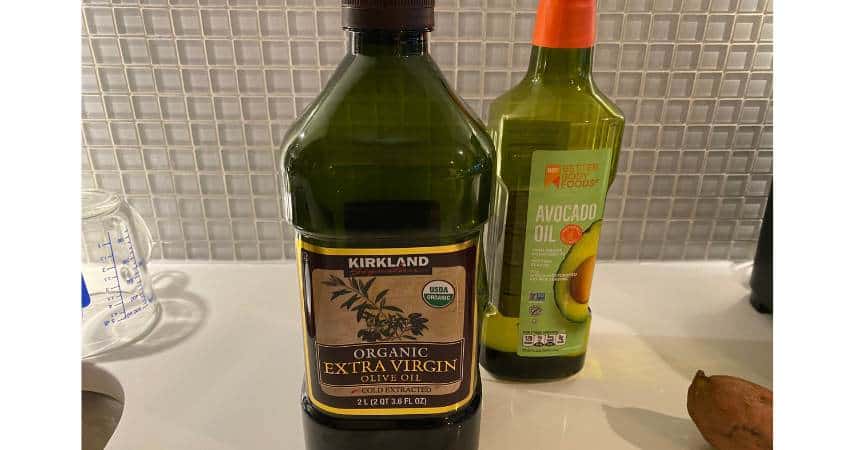
It is made by the following method:
- It is made by using the leftover paste from making extra virgin olive oil.
- The leftover paste is heated and kneaded with chemicals to release more oil, water and residue from the paste.
- The oil undergoes a separation process from the water and residue.
- It is filtered and bottled.
All olive varieties are held to certain USDA grade standards. Extra virgin olive oil is certified as having the highest grade standards for excellent flavor, odor and free fatty acid content. It must not exceed 0.8 grams of oleic acid per 100 grams.
Olive Oil vs Vegetable Oil: Nutrient Comparison
As noted earlier, vegetable oil is often a blend of different cooking oil. The only reliable nutrient information I was able to find was a vegetable blend containing the following oils:
- 50% soybean oil
- 10% corn oil
- 15% canola oil
- 25% olive
I didn’t want to use a vegetable blend containing olive oil, but it was my only reliable source. Having 25% of it improves the nutrients as compared to a vegetable blend without it or just containing soybean.
The following table compares the nutrients contained in one tablespoon of each:
| Olive Oil (1 Tbsp/13.5 grams) | Vegetable Oil (1 Tbsp/13.5 grams) | |
| Calories | 119 | 119 |
| Protein | 0 g | 0 g |
| Carbohydrates | 0 g | 0 g |
| Fiber | 0 g | 0 g |
| Fat | 13.5 g | 13.5 g |
| Sugar | 0 g | 0 g |
| Sodium | 0.27 mg | 0 g |
| Vitamin K | 8.13 mcg | 15.91 mcg |
| Vitamin E | 1.94 mg | 1.58 mg |
| Potassium | 0.135 mg | 0 mg |
| Iron | 0.076 mg | 0.021 mg |
| Calcium | 0.135 mg | 0 mg |
| Omega-3 | 103 mg | 710 g |
| Omega-6 | 1,318 mg | 5,050 g |
| Saturated Fat | 1.86 g | 1.85 g |
| Monounsaturated Fat | 9.86 g | 5.56 g |
| Polyunsaturated Fat | 1.42 g | 5.56 g |
The nutrients above may differ depending on the mix of oils used, type of olives, time of year pressed and other factors. Examining the table above, it may be difficult to determine which one has the most nutrients and healthy fats.
Let’s answer a common question, is olive oil healthier than vegetable oil?
Olive oil is healthier than vegetable oil due to its higher percentage of heart healthy fats, vitamins and minerals. It contains more vitamin E, potassium, iron and calcium than vegetable oil. It contains 77% more monounsaturated fat per tablespoon.
Vegetable oil provides a higher percentage of vitamin K and omega-3 fatty acids.
I always choose EVOO over vegetable oil. I use it for lower temperature cooking, dipping and in salads.
Let’s examine the nutrients of both one by one.
Calories
- They both contain the same amount of calories.
Vitamin K
- Vegetable oil contains 95% more vitamin K per one tablespoon.
Vitamin E
- Olive oil contains 23% more vitamin E per one tablespoon.
Potassium
- Olive oil contains more potassium per one tablespoon.
Iron
- Olive oil contains 262% more iron per one tablespoon.
Calcium
- Olive oil contains more calcium per one tablespoon.
Saturated Fat
- Olive oil contains almost the same saturated fat per one tablespoon.
Monounsaturated Fat
- Olive oil contains 77% more monounsaturated fat per one tablespoon.
Polyunsaturated Fat
- Vegetable oil contains 291% more polyunsaturated fat per one tablespoon.
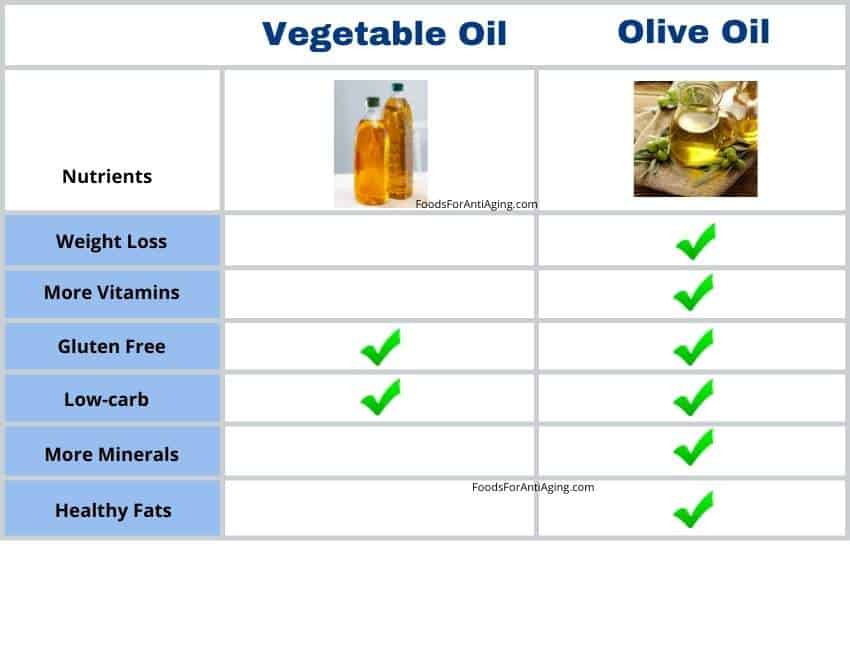
Which to Choose Based on Your Lifestyle
Weight Loss
If you’re looking to lose some weight, the number of calories may matter to you. Therefore, let’s examine which is better for weight loss.
- Even though they have a similar number of calories, olive oil is better for weight loss than vegetable oil due to its overall healthy fat content. A diet based on healthy fats is associated with weight loss.
- It contains a good number of medium-chain triglycerides which has been associated with weight loss and maintenance in studies3.
- The monounsaturated fats has been shown to increase good cholesterol and both have been associated with weight loss in studies4.
Even though it is considered a healthy addition to your diet, at 119 calories per tablespoon the calories can add up pretty fast. It’s easy to add multiple tablespoons into a salad.
Low Carb or Keto Diets
The goal of most low-carb diets is to consume few carbohydrates while adding more protein and fat. Every carbohydrate can make a difference depending on the diet followed. Therefore, let’s examine which one has fewer carbohydrates or more fat.
- Olive oil is better for low carb diets than vegetable oil due to its higher percentage of healthy fats. They both provide 13.5 grams of total fat per tablespoon. Both have an equal number of carbohydrates per tablespoon which is zero grams.
- A higher percentage of the fat is the healthier monounsaturated fats making it the better cooking oil choice.
The following video from an accredited hospital discusses olive and canola oil.
Bodybuilding
If you’re trying to gain lean muscle mass, the amount of protein and carbohydrates may make a difference. Let’s take a look at both types and determine which is better for bodybuilding.
Although olive oil and vegetable oil contain the same number of proteins and carbohydrates, olive oil is better for bodybuilding. This is due to its higher percentage of healthy fats and antioxidants.
- It contains oleic acid which has been shown to stimulate protein production and synthesis5.
- One of its antioxidants, oleocanthal, is an anti-inflammatory that also reduces pain in joints. Pain in the joints may affect workouts or the amount of weight lifted.
- The antioxidants help fight free radicals and prevent cell damage. It’s difficult to build and repair muscle cells with free radicals ((National Center for Biotechnology Information: Free radicals, antioxidants and functional foods: Impact on human health)).
- It is associated with decreases in inflammation which can benefit the joints6.
Vegan or Vegetarian
If you’re thinking about following a vegan or vegetarian diet lifestyle, consuming dairy products or animal-derived products is important. Knowing which one is vegan or vegetarian friendly may help you choose between the two.
Olive oil and vegetable oil are plant based and does not contain animal products making them both beneficial for vegans and vegetarians.
Gluten Free
Avoiding any gluten is the main goal for people who wish to follow a gluten free diet or have Celiac disease. Therefore, let’s examine which one is gluten free.
- Olive and vegetable oil are both gluten free and good for gluten free diets.
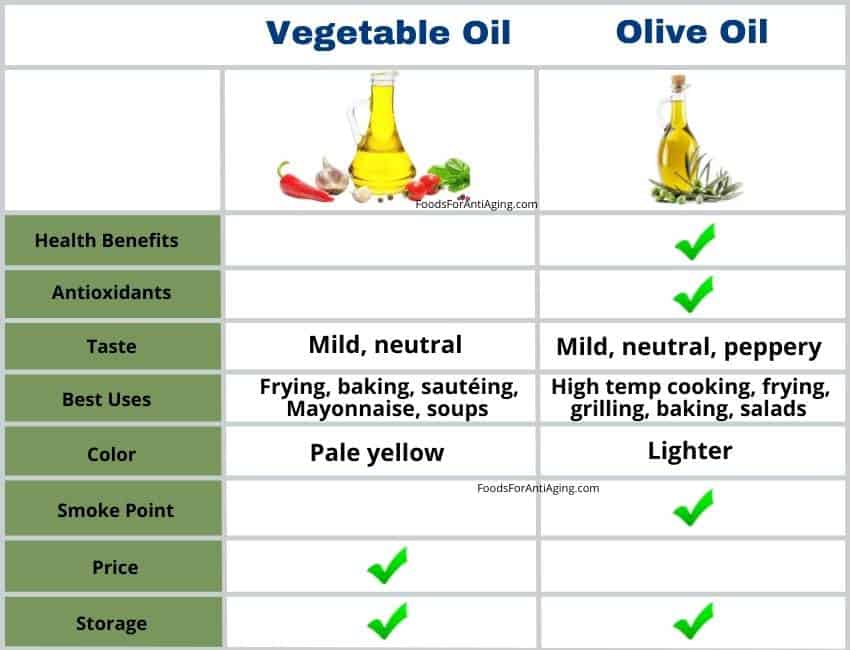
Taste
Let’s face it, If you’re like me I won’t eat a food considered healthy unless I can tolerate the taste. I think if someone doesn’t like the flavor of a food they won’t purchase it. Therefore, let’s examine how the taste of each one and how they compare.
Olive oil has a stronger flavor than the milder vegetable oil. Vegetable oil has a neutral taste with no real flavor, while olive oil has a hint of olives and is peppery. The virgin olive type has more flavor than the refined versions.
I wanted to get the opinion of real people like you by conducting some original research. Therefore, I reached out to some readers, clients and members of food groups. I asked, which one tastes better?
- 78% said they preferred the taste of olive oil.
- 18% said they preferred the taste of vegetable oil.
- 4% said they had no preference.
To conduct more research, I participated in and setup my own blind taste test. I tasted one teaspoon of each one and ended choosing the olive oil as the better tasting one.
Substitutions for Recipes
Have you ever wanted to try a new recipe the last minute and found out you didn’t have the food ingredient at home? Unable to go out to the store or just don’t want to, you’ve probably wondered if you can use another type in its place.
Reasons why people will want to substitute one for the other in a recipe:
- Availability
- Smoke point
- Taste
- Variety
- Price
This makes people wonder if they can substitute one for the other.
Olive oil and vegetable oil can substitute for each other in cold recipes although the flavor will be stronger when using olive oil. In hot recipes refined can substitute for each other up to 428°F. Refined olive oil can substitute for vegetable up to 470°F due to its smoke point.
The following video explains which are the better tasting olive oils.
Smoke Points
The following are the smoke points for each one:
| Type of Oil & Fats | Smoke Point (Fahrenheit) |
| Vegetable Oil – blend | 428°F |
| Soybean Oil | 453°F |
| Olive Oil – Refined | 470°F |
| Olive Oil – Virgin | 410°F |
| Olive Oil – Extra virgin | 375°F |
Smoke point source ((Wikipedia: Smoke point))
I included the smoke point for soybean oil because many of the vegetable oils sold in the United States are 100% soybean oil. Therefore, the smoke point for vegetable oil contained 100% soybean oil is 453°F.
I wrote an entire article comparing soybean oil. Find out how they compared here.
How to Incorporate Them Into Your Recipes
Vegetable Oil
Some people prefer using it because it doesn’t overpower the other flavors in a recipe. Using it results in a neutral flavor and more people use it for cooking or baking than for salads or dipping.
Although when one is needed in something cold, it will be used without the added flavor. A great example of this may be when making a mayonnaise.
How About Canola Oil?
Also, before using it, make sure you know which variety you have. Vegetable oil is either a combination of other types like canola oil or soybean oil. The smoke points can vary depending on which one you have.
The smoke point of canola oil is 400 degrees.
Use vegetable for the following:
- Use it when cooking in temperatures above 375 degrees (the smoke point of EVOO).
- Frying
- Stir fry
- Baking
- Sauteing
- Soups
- Mayonnaise
- Marinades
Olive Oil
Use olive oil when you want its flavor in a dish and for moderate-heat cooking.
- Use refined for any cooking in temperatures up to 470 degrees.
- Use extra virgin for cooking in temperatures up to 375 degrees.
- Frying
- Stir-frying
- Grilling
- Baking
- Dipping
- Salads
- Dressings

Vegetable and Olive Oils: The Prices
With inflation lately, the price of groceries keeps rising. It seems I spend more every month at the supermarket. For this reason and others, I’m sure the prices of food matters to most people.
I checked the price of store brands to keep things on an even playing field. I divided the price by the number of ounces. Therefore, let’s examine the prices.
Olive oil costs 118% more than vegetable oil per ounce. Its average cost per ounce is $0.24 and the average price for vegetable oil is $0.11 per ounce.
To conduct my own research, I checked three different supermarkets located in my area. All the supermarkets are on different levels of pricing. Walmart is the most economical and Stop and Shop being more expensive.
Here are my findings, first I visited Walmart:
Walmart:
- Olive oil (Store brand) – 51 ounce $10.98 ($0.21 per ounce)
- Vegetable oil (Store brand) – 48 ounce $3.47 ($0.07 per ounce)
Stop and Shop:
- Olive oil (Store brand) – 25.3 ounce $6.79 ($0.27 per ounce)
- Vegetable oil (Store brand) – 24 ounce $3.99 ($0.17 per ounce)
Shoprite
- Olive oil (Store brand) – 25.5 ounce $6.49 ($0.25 per ounce)
- Vegetable oil (Store brand) – 16 ounce $2.49 ($0.16 per ounce)
The following video explains things to know when shopping for olive oil.
How to Store
Good quality cooking oil can be costly, therefore, the shelf life you get out of it is important. In addition, improper storage may lessen the taste and quality. Let’s examine how each one should be stored. They both can be stored the same way.
Store olive oil or vegetable oil in a cool, dark location away from light. It’s best to store either one in a tinted glass container. Both oils should be kept at a temperature between 55-60℉, although they can be refrigerated or frozen if needed.
Both should be stored in the refrigerator if the room temperature rises above 70℉. Leaving either one in warmer temperatures affects shelf life and lessens the quality. Unrefined or extra virgin can go bad quicker than refined oils.
For this reason, many people store them in the refrigerator regardless of the room temperature. Due to heat-creating appliances and heated ovens, kitchens tend to be a bit warmer than most other rooms of the house.
Therefore, be sure to monitor your bottles and the temperature of the room.
I store mine in the kitchen cabinet. Although it’s a cool area away from the oven and any heat.
Find out how avocado oil compared in my article my article.
Health Benefits
Both contain healthy fats and antioxidants. The fats and antioxidants provide many health benefits which I’ll examine in this section.
Olive Oil Benefits
Heart Disease
Heart disease and stroke are among the most common causes of death throughout the world. Studies have shown heart disease is lower in the Mediterranean countries where olive oil is a big part of their diets. There are many ways it is beneficial for the heart including the following:
Blood Vessel Health It has been shown to help improve the lining of blood vessels. A study published in 2015 showed blood vessels opened up and increased blood flow in people who included it in their diet7.
Reducing Inflammation It is associated with decreases in inflammation which is a main component of heart disease. One of its antioxidants, oleocanthal, is an anti-inflammatory that also reduces pain6.
Lowering Blood Pressure Studies have shown an association between lower blood pressure and an increase in olive oil consumption. The Mediterranean diet has been linked to lower blood pressure and cardiovascular disease8.
Brain Health
Several studies conducted on humans have shown the Mediterranean diet may be associated with a reduced risk of cognitive problems and dementia9.
Alzheimer’s disease is the most common form of dementia causing problems with thinking, memory and behavior. A common feature of the disease is the build-up of proteins known as beta-amyloid plaques in certain neurons in the brain.
Animal studies have shown EVOO to clear the beta-amyloid proteins from the brain helping to prevent Alzheimer’s disease10.
The following video explains the benefits and compares both oils.
Cancer
The cancer rates in Mediterranean countries are lower than other places. As noted earlier, EVOO consumption is a huge part of the diet. Antioxidants are believed to contribute to the killing of cancer cells.
In a 2015 study oleocanthal helped kill cancer cells in less than one hour11.
Another study published in 2015 evaluated the consumption of the Mediterranean diet and the incidence of breast cancer. For a six-year period, 4,282 women aged 60 to 80 years followed three different diets:
- Mediterranean diet supplemented with extra virgin olive oil (EVOO).
- Mediterranean diet supplemented with mixed nuts.
- A reduced fat diet.
After 4.8 years 35 of the women developed breast cancer. The lowest rate of breast cancer was seen in the women who supplemented with the EVOO12. Oleic acid has been associated with helping to reduce the risk of cancers.
Find out how sesame oil compared in my article here.

Vegetable Oil Benefits
Vegetable oil has some benefits of its own and also some concerns if consumed too much.
Heart Disease
It contains a good number of monounsaturated fats. As noted above, they are extremely beneficial for the heart and increasing good cholesterol. The one utilized for this article is low in saturated fat and has a high percentage of polyunsaturated fat.
Studies show replacing saturated fat with polyunsaturated reduces heart problems by 17%13.
Omega-3 fatty acids is also beneficial for the heart. It’s because omega-3 fatty acids help keep arteries healthy. The omega-3s may help with the following:
- Keeping bad cholesterol low.
- Keeping good cholesterol high.
- Reducing inflammation.
- Reducing plaque build-up.
- Lowering triglycerides
- Help keep the heart rhythms more normal.
DHA and EPA, two of the fatty acids, are associated with lowering blood pressure and improving the health of blood vessels ((National Center for Biotechnology: Marine Omega-3 Supplementation and Cardiovascular Disease)).
However, nutritionists have raised concerns about the high amounts of omega-6 found in some vegetable oils. Moderation is the key and it’s better to use olive oil more often and when it makes sense.
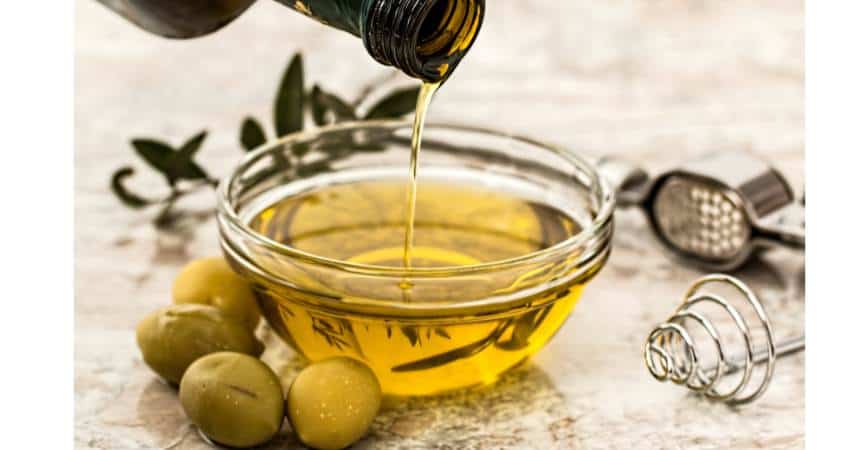
Joint Pain
Studies suggest omega-3s can help reduce joint pain and stiffness in people with rheumatoid arthritis. They may also boost the effectiveness of anti-inflammatory drugs.
Grapeseed oil is another one compared in my comparison article.
If you have any questions about this article don’t hesitate to email us. You can find an email on our contact page.
Read More Oil Articles
Olive Oil vs Coconut Oil: Which is Better? Let’s Compare
Butter vs Olive Oil: Which is Better? A Complete Comparison
Sunflower Oil vs Olive Oil: Which is Better? Let’s Compare
Olive Oil vs Canola Oil: Which is Better? Let’s Compare
The Complete Guide To Storing Extra Virgin Olive Oil
Can Extra Virgin Olive Oil Go Bad? What You Need To Know
Can I Replace Olive Oil With Coconut Oil?
This is the Best Way to Store Your Olive Oil
- USDA: Oil, olive, salad or cooking [↩]
- USDA: Vegetable oil, NFS [↩]
- National Center for Biotechnology Information: Effects of medium-chain triglycerides on weight loss and body composition: a meta-analysis of randomized controlled trials [↩]
- National Center for Biotechnology Information: High Fat Diet with a High Monounsaturated Fatty Acid and Polyunsaturated/Saturated Fatty Acid Ratio Suppresses Body Fat Accumulation and Weight Gain in Obese Hamsters [↩]
- National Center for Biotechnology Information: An overview of the modulatory effects of oleic acid in health and disease [↩]
- National center for Biotechnology Information: Olive Oil-related Anti-inflammatory Effects on Atherosclerosis: Potential Clinical Implications [↩] [↩]
- (National Center for Biotechnology Information: Effects of Olive Oil on Markers of Inflammation and Endothelial Function-A Systematic Review and Meta-Analysis [↩]
- National Center for Biotechnology Information: Virgin Olive Oil and Hypertension [↩]
- National Center for Biotechnology Information: Mediterranean Diet and Risk of Dementia and Alzheimer’s Disease in the EPIC-Spain Dementia Cohort Study [↩]
- National Center for Biotechnology Information: Extra-Virgin Olive Oil Attenuates Amyloid-β and Tau Pathologies in the Brains of TgSwDI Mice [↩]
- Taylor & Francis Online: (-)-Oleocanthal rapidly and selectively induces cancer cell death via lysosomal membrane permeabilization [↩]
- Jama Internal Medicine: Mediterranean Diet and Invasive Breast Cancer Risk Among Women at High Cardiovascular Risk in the PREDIMED Trial [↩]
- National Center for Biotechnology Information: Reduction in saturated fat intake for cardiovascular disease [↩]
